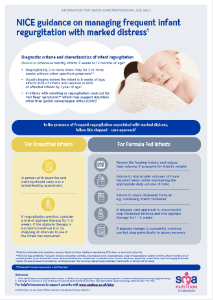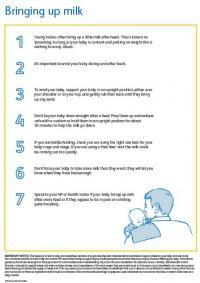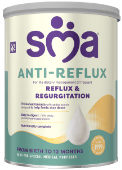Feeding issues, also known as functional gastrointestinal disorders (FGIDs) are a common part of life for infants2 and can have a considerable impact on both the infant and parents.
As parents try to navigate through this confusing time, they may try a variety of options, research feeding issues online and visit their GP several times in order to find a solution, impacting on the time and resources of healthcare professionals.3
Gastro-oesophageal reflux and effortless regurgitation in infants is common and affects at least 40% of infants1
If there are no other symptoms and the baby is growing well and seems happy, parents should be reassured and supported to take steps that may help, as outlined below.


Helpsheet
Download the Bringing Up Milk helpsheet for parents. Available in multiple languages from our resources section.
Find out moreManaging infant regurgitation
To manage frequent regurgitation associated with marked distress in breastfed infants, NICE guidelines recommends that a healthcare professional with appropriate expertise and training should carry out a breastfeeding assessment first-line.1
To manage frequent regurgitation associated with marked distress in formula-fed infants, NICE recommend this stepped care approach1 as shown below:
- Review the feeding history and reduce feed volumes if excessive for infant’s weight.
- Advice to trial smaller volumes of more frequent feeds (while maintaining the appropriate daily volume of milk)
- Advice to trial a thickened formula† e.g. containing starch thickener††
- If the stepped care approach is unsuccessful, stop using the thickened formula and trial alginate therapy for 1 – 2 weeks
- If alginate therapy is successful, continue use but stop periodically to assess recovery
SMA ® Anti-Reflux is a thickened formula for the dietary management of reflux and regurgitation, it is suitable from birth until 1 year of age and shown to significantly reduce the number of daily regurgitation episodes4**.
It is a suitable thickened formula for managing regurgitation as recommended by the NICE stepped care approach.1
SMA ® Anti-Reflux is the only anti-reflux formula in the UK&I with a unique combination of easily digestible starch and 100% whey, partially hydrolysed protein, to help manage reflux and regurgitation4,5
Digestible starch thickeners do not interfere with the availability of calcium, iron and zinc compared to indigestible thickeners, such as Carob bean gum6,7
* Associated with marked distress
†Thickened formulas may require a fast flow teat
††Not all thickened formulas are the same, consider one which also contains partially hydrolysed proteins which allows for faster gastric emptying.8
**p<0.0001, compared to a standard formula





